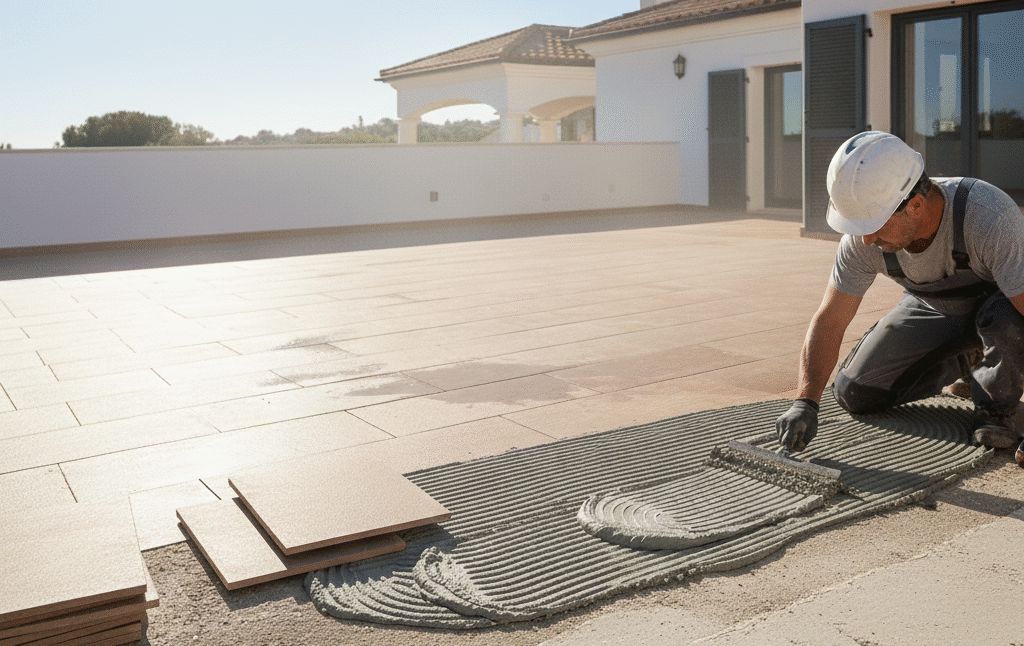Outdoor Tile Adhesive Requirements for Sun-Exposed, Heat-Prone & Weather-Changing Areas
Introduction
Outdoor tiling looks simple, but the conditions it must withstand are far more demanding than interior applications. Surfaces exposed to direct sunlight, high temperatures, rain cycles, and seasonal movement require a tile adhesive formulated to withstand these stresses. Using the wrong material can lead to debonding, cracks, fading, or tiles lifting within months. A reliable outdoor tile adhesive must handle all these factors without losing bond strength or flexibility.
Common Question Asked:
Q1. Is normal tile adhesive suitable for outdoor and sun-exposed installations?
No. Outdoor surfaces require a flexible, polymer-modified, weather-resistant adhesive designed to handle temperature changes, moisture, and substrate movement.
Why Outdoor Areas Need Specialized Tile Adhesives
Outdoor surfaces behave differently from indoor floors or walls. They face multiple stress factors every day:
Heat Exposure and Thermal Expansion
Tiles and substrates expand during the day and contract at night. In high-temperature zones or direct sunlight:
- RCC slabs expand significantly
- Large-format tiles absorb and release heat rapidly
- Differential thermal movement creates shear stress
Only a flexible, polymer tile adhesive can tolerate these movements without cracking.
Moisture Cycles and Rain Exposure
Outdoor surfaces go through:
- Wetting during rain
- Drying during the heat
- Damp conditions during the monsoon humidity
Repeated moisture cycles weaken low-grade adhesives. A suitable exterior tile adhesive must resist softening when wet and shrinking when dry.
Wind, Uplift & Structural Vibration
Balconies, facades, terraces, and open corridors experience:
- Micro-vibrations
- Wind uplift pressure
- Structural movement at slab joints
A rigid or low-polymer adhesive cannot maintain attachment under these conditions.
Core Requirements of an Outdoor Tile Adhesive
1. High Polymer Modification
Polymers increase flexibility, bonding strength, and shock resistance.
A high-performance polymer tile adhesive helps accommodate:
- Thermal movement
- Micro-cracks in RCC
- Heavy footfall
- Outdoor impacts
TERATILE GOLD and TERATILE PLATINUM are engineered with polymer systems suitable for exterior use.
2. Water Resistance
Outdoor areas frequently remain wet. Moisture entering the adhesive layer can weaken the bond or create hollow spots.
A proper waterproof tile adhesive prevents:
- Water ingress under tiles
- Efflorescence
- Bond failure during monsoon seasons
3. Flexibility for Surface Movement
Outdoor RCC slabs move more than indoor flooring. Adhesives must meet deformability standards.
In general:
- S1 adhesives are deformable
- S2 adhesives are highly deformable
For most exterior installations, S1-level flexibility is essential. TERATILE PLATINUM demonstrates flexibility suitable for dynamic outdoor surfaces.
4. Strong Bonding on Dense RCC and External Surfaces
Exterior RCC is often smooth, exposed, and undergoes surface shrinkage. A good adhesive must:
- Provide strong mechanical gripping
- Retain bond strength under heat
- Maintain adhesion when the surface is damp or hot
Polymer-modified adhesives outperform traditional cement-sand mortar in all these aspects.
5. UV and Temperature Resistance
Outdoor surfaces can reach temperatures above 50–60°C in Indian summers.
Suitable adhesives must retain:
- Tensile strength
- Bond adhesion
- Elasticity
TERATILE GOLD and TERATILE SILVER maintain stability under heat exposure and UV impact.
Where Outdoor Tile Adhesive Is Required
Outdoor and weather-exposed surfaces include:
Terraces & Rooftops
High thermal expansion; potential for waterproofing layer movement.
Balconies & Sit-Out Areas
Exposure to sunlight, rain, and wind.
Building Facades & Cladding
Heavy thermal shifts and wind pressure need a strong exterior tile adhesive.
Parking Zones & Podium Slabs
High mechanical load + direct exposure.
Swimming Pool Decks
Wet-dry cycles; slip-risk if tiles detach.
Garden Pathways & Courtyards
Constant outdoor wear and temperature impact.
Redwop Products Suitable for Outdoor & Weather-Exposed Tiling
1. TERATILE GOLD
A high-performance polymer tile adhesive suitable for:
- Exterior floors and walls
- Vitrified and ceramic tiles
- Heat-exposed RCC substrates
TERATILE GOLD maintains bonding strength under moisture, heat, and tile movement.
2. TERATILE PLATINUM
A premium adhesive formulated for demanding outdoor environments.
It offers:
- Higher flexibility (S1-type performance)
- Strong adhesion on RCC
- High resistance to temperature variations
TERATILE PLATINUM Ideal for terraces, facades, parking decks, and podium slabs.
3. TERATILE SILVER
TERATILE SILVER Suitable for:
- Light-to-moderate exterior applications
- Ceramic and vitrified tiles
- Balconies and semi-exposed zones
Best Practices for Outdoor Tiling with Adhesive
1. Ensure Proper Surface Preparation
- Clean dust, laitance, and debris
- Check substrate dryness
- Repair cracks before installation
2. Maintain Adequate Coverage
Outdoor surfaces require a minimum of 90–100% adhesive coverage for safety.
Back-buttering large tiles is recommended.
3. Install Expansion Joints
Movement joints every 3–4 meters prevent tile stress build-up.
4. Control Application Time
Install tiles within the adhesive’s open time to prevent weak bonding.
5. Allow Proper Curing
Avoid foot traffic and water exposure until the adhesive fully cures.
Conclusion
Outdoor installations operate under tougher conditions than indoor spaces. Heat, moisture, wind, and structural movement demand a weather-resistant, flexible, and polymer tile adhesive outdoor tile adhesive.
Redwop’s TERATILE GOLD, TERATILE PLATINUM, and TERATILE SILVER provide the strength, flexibility, and durability needed for sun-exposed and weather-changing environments.
For detailed guidance or site-specific recommendations, Contact Us.
FAQs
-
1. Can indoor tile adhesive be used outdoors?
No. Indoor adhesives lack the flexibility and weather resistance needed for outdoor conditions.
-
2. Which adhesive is best for outdoor vitrified tiles?
Polymer-modified adhesives like TERATILE GOLD or TERATILE PLATINUM offer suitable performance.
-
3. Does outdoor adhesive need to be waterproof?
Yes. Waterproofing helps prevent bond failure during wet cycles or monsoon seasons.
-
4. Are flexible adhesives necessary for terraces?
Yes. Terraces experience significant thermal movement, making flexibility crucial.
-
5. Can I use mortar instead of outdoor tile adhesive?
No. Mortar lacks the polymer strength, flexibility, and bonding performance needed for exposed environments.



